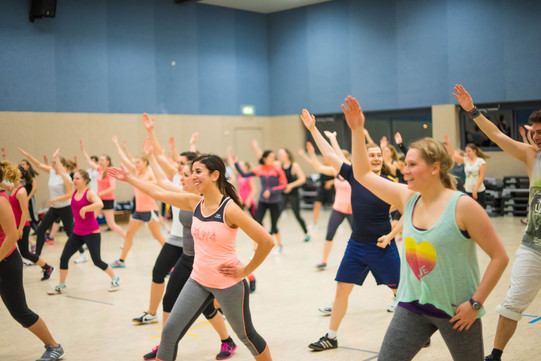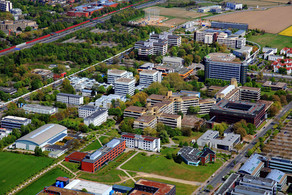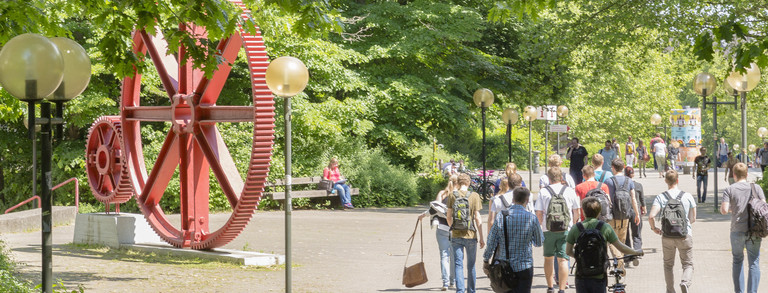Health
Preventive health care on the campus of TU Dortmund University is provided by the Occupational Health Care, the Occupational Health Management (Betriebliches Gesundheitsmanagement, BGM), the Psychological Student Advisory Service and the University Sports. In addition to mandatory and voluntary Occupational Safety Services, there are other consulting services for employees. The Student Health Management Student Health Management (Studentisches Geusndheitsmanagement, SGM) (in German) will also be expanded further.
Occupational Health Care
The aim of the statutory Occupational Health Care (in German) is to detect work-related health problems at an early stage and to prevent work-related illnesses, including occupational illnesses. It is organized by the Office of Occupational Safety, Environmental and Health Protection together with an external company medical service. In addition to occupational health care, the Occupational Health Management (BGM) organizes preventative services for employees.
Occupational Health Management
The Occupational Health Management (BGM) at TU Dortmund University strengthens the health and well-being of employees at their workplace. The BGM measures help to optimize working conditions and better cope with the challenges of the working world, such as increasing time pressure and growing responsibility. All TU Dortmund University employees can take advantage of various Health Offers such as further training, break activities, screenings and consultations. In total, the occupational health management services were used 2,158 times in 2024. A bonus system motivates employees to use the health offer: Stamps can be collected in a health passport (internal link) throughout the calendar year, e.g. for participation in sports activities, special further training events, occupational health care services, advice on workplace ergonomics or first aid courses. At the end of the year, successful participants receive sports bonuses and take part in a prize draw. In addition to the existing and proven offers, the BGM places new measures and special campaigns every year and regularly organizes a health week.
Source: Zahlen, Daten, Fakten 2024; p. 53
Bar chart showing the health services offered in 2024 and the participants in each service.
Detailed data can be found in the following table:
| Offers | Participants |
|---|---|
| Occupational health care | 875 |
| Mobile massage | 162 |
| 15-minute workout during the lunch break | 354 |
| Flu vaccination | 160 |
| Management development | 118 |
| Circuit training in the in-house fitness studio | 310 |
| Ergonomics advice | 16 |
| Relaxation break Sound bowl | 36 |
| Memberships of employees in the in-house fitness studio | 75 |
Occupational Rehabilitation Management
The TU Dortmund University's Staff Unit Occupational Rehabilitation Management (Betriebliches Eingliederungsmanagement, BEM) (in German) implements the legal German requirements of Occupational Rehabilitation (in German) independently and confidentially. Affected employees can take advantage of the voluntary offers if they wish, and they only have to disclose what they consider necessary. The BEM portfolio includes preventative support services, e.g. for the early detection of health problems or to prevent or reduce disabilities and chronic illnesses, as well as aftercare support services for medical or occupational rehabilitation and gradual reintegration. The BEM at TU Dortmund University focuses in particular on those affected and offers them a high degree of co-determination regarding necessary steps such as the ergonomic and, if necessary, technical design of the workplace, the reduction of working hours, internal and professional qualification measures or the health or illness-oriented design of the workplace. In addition, TU Dortmund University offers its students and employees care advice and an online care meeting (in German) as part of the BEM: A trained employee offers support as the first point of contact for questions about caring for relatives.
Psychological Student Advisory Service at TU Dortmund University
As part of the Central Student Advisory Service (ZSB) , the Psychological Student Advisory Service (PSB) is a service facility of TU Dortmund University for its students and employees. The Advise Center supports TU members in developing coping strategies in difficult life situations and offers opportunities for skills development. This includes a wide range of specific and individualized services such as one-to-one sessions, group offers and lectures. The psychologists are subject to a legal duty of confidentiality. The advisory services are also free of charge.
Social Contact Person
The Social Contact Person (Soziale Ansprechpartnerin, SAPa) offers employees collegial support in crisis situations. Tey advice on topics such as addiction, bereavement, and mobbing, and offers support in the event of psychological problems and conflicts in both the professional and private spheres. During the counseling sessions, the SAPa develops approaches with the concerned persons to overcome the crises and problems; however, the Social Contact Person does not take therapeutic action. If necessary, the Social Contact Person also refers those seeking advice to other TU Dortmund University institutions or to external agencies.
Nutrition
The Studierendenwerk Dortmund (in German) provides students at TU Dortmund University, Fachhochschule Dortmund University of Applied Sciences and Arts and South Westphalia University of Applied Sciences with various food and drink options in 18 canteens and cafeterias (in German). From Monday to Friday, the cafeteria offers four basic dishes as well as three special meals and a salad and pasta buffet. Further (specialized) gastronomic offers are spread across the campus. The proportion of vegetarian and vegan dishes is at least 50%. The proportion of deep-fried dishes was reduced: By changing processes (e.g. the use of convection ovens), it was possible to reduce the fat content of some of the main courses without any noticeable loss of quality. Since March 2021, meals have no longer been served in disposable tableware for consumption outside the restaurant. Guests can use their own crockery or reusable crockery from a rental provider. Children of students receive a free children's menu up to the age of 10. A children's play corner has also been set up in the cafeteria. High chairs for children are available.
In April 2022, the Sustainability Office and the AStA of TU Dortmund University, together with the Studierendenwerk Dortmund, conducted a survey among the users of the Studierendenwerk's gastronomic offer. The main aim of the Sustainability Office was to communicate the impact and climate footprint of nutrition and thus ensure a more climate-friendly diet in the long term by providing individual decision-making support. This is in line with the Studierendenwerk's goal of becoming climate-neutral by 2030.


University sports
The office of University Sports (Hochschulsport, hsp) organizes a diverse and varied sports program with 74 different sports for students and employees of TU Dortmund University and Fachhochschule Dortmund University of Applied Sciences and Arts. In 2022, approx. 720 courses were offered and approx. 5,000 sports tickets were issued as part of the course programs in SoSe 2022 and WiSe 2022/23. In addition, the hsp coordinates and organizes various sporting events, e.g. participation in competitions such as the German University Championships. A Campus Run takes place once a year with distances ranging from 2.5 km to 10 km. In 2022, 1,250 participants took part in the Campus Run. Up to 24 teams take part in the Soccer Campus League in summer and winter. TU members can also work out in the campus gym Fitnessförderwerk (FFW) with 500 active members.
Sport with a disability
The University Sports (hsp) makes every effort to include people with disabilities in its offer. The hsp works with interested customers on an individual basis and selects suitable offers (in German). One special feature, for example, is Showdown (in German), a sport for people with visual impairments. Special glasses are used to include sighted people.
The sports facilities at Otto-Hahn-Straße 3 are barrier-free. Ramps for wheelchair users were built during the renovation of the outdoor area. The new extension building will be completely barrier-free. There will also be toilets, showers and changing rooms for non-binary people.




